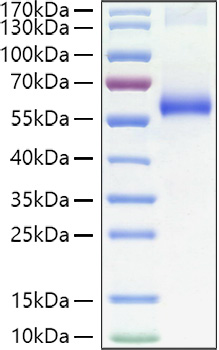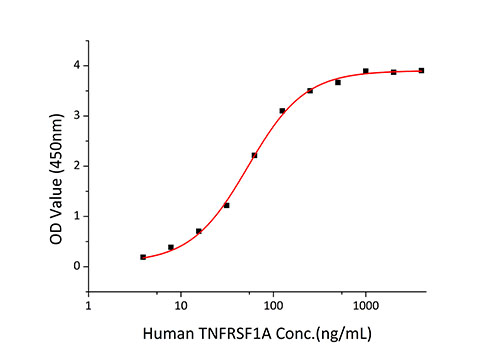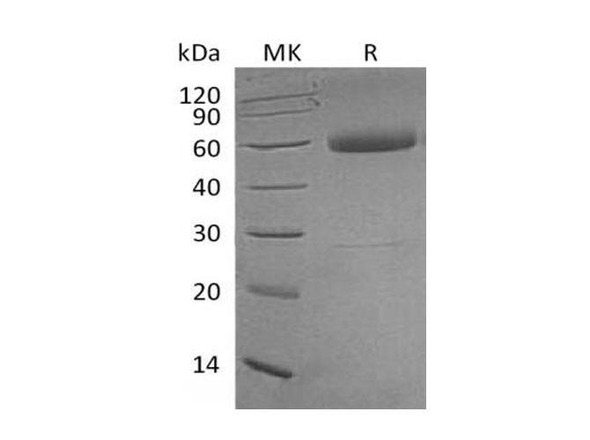Description
Recombinant Human TNFRSF1A/TNF-R1/CD120a Protein
The Recombinant Human TNFRSF1A/TNF-R1/CD120a Protein is a biologically active recombinant protein that plays a significant role in various cellular processes and signaling pathways in human biology. This protein is widely employed in immunological research, cell biology studies, protein-protein interaction analyses, and therapeutic development, providing researchers with a reliable tool for investigating TNFRSF1A/TNF-R1/CD120a function and its implications in health and disease.
This product (SKU: RPCB0927) is produced using HEK293 cells and features a C-hFc tag for convenient detection and purification. The protein exhibits a calculated molecular weight of 46.45 kDa with an observed molecular weight of 55-65 kDa under denaturing conditions, achieving ≥ 90 % as determined by SDS-PAGE.. Functional bioactivity has been validated through rigorous quality control assays, confirming its suitability for demanding research applications.
Key Features
| High Purity by Affinity Chromatography | |
| Mammalian & Bacterial Expression Systems | |
| High lot-to-lot consistency via strict QC |
| Product Name: | Recombinant Human TNFRSF1A/TNF-R1/CD120a Protein |
| SKU: | RPCB0927 |
| Size: | 10 μg , 20 μg , 50 μg , 100 μg |
| Reactivity: | Human |
| Synonyms: | TNFRSF1A, CD120a, FPF, TBP1, TNF-R, TNF-R-I, TNF-R55, TNFAR, TNFR1, TNFR55, TNFR60, p55, p55-R, p60 |
| Tag: | C-hFc |
| Expression Host: | HEK293 cells |
| Calculated MW: | 46.45 kDa |
| Observed MW: | 55-65 kDa |
| Gene ID: | 7132 |
| Protein Description: | High quality, high purity and low endotoxin recombinant Recombinant Human TNFRSF1A/TNF-R1/CD120a Protein (RPCB0927), tested reactivity in HEK293 cells and has been validated in SDS-PAGE.100% guaranteed. |
| Endotoxin: | < 1 EU/μg of the protein by LAL method. |
| Purity: | ≥ 90 % as determined by SDS-PAGE. |
| Formulation: | Lyophilized from a 0.22 μm filtered solution of PBS, pH 7.4. |
| Bio-Activity: |
|
| Reconstitution: | Centrifuge the vial before opening. Reconstitute to a concentration of 0.1-0.5 mg/mL in sterile distilled water. Avoid vortex or vigorously pipetting the protein. For long term storage, it is recommended to add a carrier protein or stablizer (e.g. 0.1% BSA, 5% HSA, 10% FBS or 5% Trehalose), and aliquot the reconstituted protein solution to minimize free-thaw cycles. |
| Storage: | Store at -20℃.Store the lyophilized protein at -20℃ to -80 ℃ up to 1 year from the date of receipt. After reconstitution, the protein solution is stable at -20℃ for 3 months, at 2-8℃ for up to 1 week. |
The cluster of differentiation (CD) system is commonly used as cell markers in Immunophenotyping. Different kinds of cells in the immune system can be identified through the surface CD molecules which associating with the immune function of the cell. There are more than 320 CD unique clusters and subclusters have been identified. Some of the CD molecules serve as receptors or ligands important to the cell through initiating a signal cascade which then alter the behavior of the cell. Some CD proteins do not take part in cell signal process but have other functions such as cell adhesion. CD120a (cluste of differentiation 120a), also known as TNFR1 / TNFRSF1A, is a member of CD family, tumor necrosis factor receptor superfamily. CD120a is one of the most primary receptors for the tumor necrosis factor-alpha. It has been shown to be localized to both plasma membrane lipid rafts and the trans golgi complex with the help of the death domain (DD). CD120a can activate the transcription factor NF-κB, mediate apoptosis, and regulate inflammation processes.








